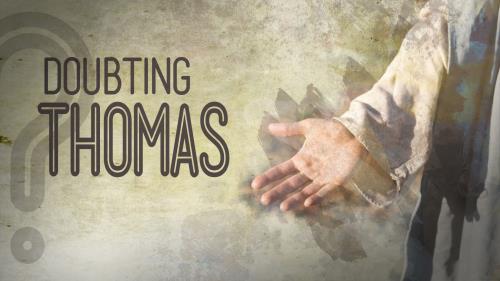-
Faith That Works Series
Contributed by Alison Bucklin on Nov 28, 2017 (message contributor)
Summary: What you believe governs what you do; if you don't do what Jesus commands, you don't really believe what he says. Or some other belief is stronger.
As many of you know, my mother is coming to visit me in a couple of weeks. As a matter of fact, she'll be playing for the Sunday service on the 23rd. And guess what? I'm going to finish emptying out my boxes before she arrives. This is because I know my mother, and I know she'll be here. Because I really believe that she'll do what she says, and that she has already bought her tickets, I am going to act on my knowledge and belief.
What we believe determines how we act.
It's not what we say we believe, but what we actually believe, that governs our behavior. For instance, I may say I believe that exercise is good for me. And I actually do believe that. But since I'm not following through on what I say I believe, I must be acting on another, stronger belief - one that I may not want to acknowledge.
There is only one reason that belief isn't followed by action.
And that is that another, stronger belief is getting in the way.
The story that is always told to illustrate the principle that true faith results in action is the one about the great tightrope walker, Blondin. At one time during his long and illustrious career, he crossed Niagara Falls on a tightrope. He did this several times before the awestruck audience, and then he turned to them and asked, "How many believe I can walk across the falls pushing a wheelbarrow?" People cheered loudly — they were sure the great Blondin could do it. Then he asked, "How many believe I can push a wheelbarrow across the tightrope with a man sitting in it?" Again, the cheers almost drowned out the sound of the falls. Blondin then pointed to one of the most enthusiastic men in the audience, and said, "Okay, you get into the wheelbarrow." The man quickly disappeared into the crowd.
Why didn't he accept the challenge? Either he really didn't believe that Blondin could do it, or the fleeting fame it would have brought him wasn't worth the risk.
We hold a lot of conflicting beliefs, beliefs that fight against each other every time we have to make a decision. Here's a simple example. Two proverbs, that is, wise sayings that help guide us through life, give diametrically opposite advice. How many of you have heard, the saying "Look before you leap" ? Here's the second one: "He who hesitates is lost."
Which one should you follow?
The anser is, "it depends." That's not a whole lot of help, is it. But - like most important decisions in life - whose advice to listen to takes discernment, and an understanding of the context.
Think about it. If you were speaking to a bungee jumper, you might want to remind them to "Look before you leap." But if you're dithering about whether or not to snap up the bargain of a lifetime, you might need to remind yourself that "He who hesitates is lost." It also depends on the person. Some people need to be held back, others need to be urged forward. And in either case, whatever you decide depends on how badly you want whatever it is you're thinking about pursuing.
There seems to be a similar contradiction in this passage. The Apostle Paul goes to great pains to emphasize that we are not saved by works, but by faith alone, writing to the Ephesians, "For by grace you have been saved through faith, and this is not your own doing; it is the gift of God - not the result of works, so that no one may boast." [Eph 2:8-9] Martin Luther didn't like this book of the Bible, this letter from James, with its emphasis on right action. And that is because his whole life had been transformed through an encounter with the Paul's letter to the Romans, where he quotes Habbakuk, saying "the just shall live by faith." [Hab 2:4, Rom 1:17] In fact, Luther called the letter "a right strawy epistle."
So when James seems to say says that we are justified by our works, on the surface it looks as though James and Paul are at odds with how they view the teachings of Jesus.
But remember that whenever Paul talks about the law, he is talking about what it takes to get right with God, that is, what do you have to do to be considered one of God's people. There were a lot of very sincere and faithful people who believed that you had to be circumcised and eat kosher. Paul had a really uphill climb to convince them otherwise, and in the end the Jewish leaders disowned the followers of Christ because they couldn't abandon their centuries old identification of godliness with specific external symbols.

 Sermon Central
Sermon Central



